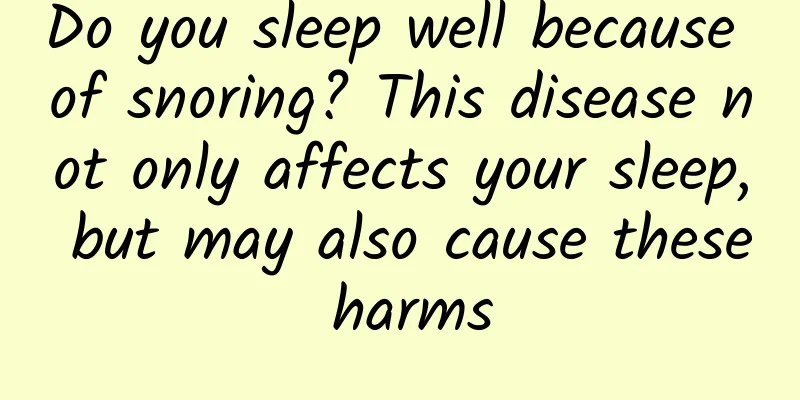Do you sleep well because of snoring? This disease not only affects your sleep, but may also cause these harms

|
Sleep apnea syndrome is a common sleep disorder that makes people lose their peace of mind at night. The name of this disease sounds a bit scary, but we can understand it in another way. First, let's explain what sleep apnea is. In simple terms, when a person is sleeping, their breathing stops temporarily and then starts again. This process may be repeated many times, resulting in poor sleep quality and feeling tired and sleepy during the day. Imagine you are enjoying a sweet dream, and suddenly, your breathing stops. Your body starts sending warning signals, telling you that you need to breathe. So, you wake up, gasp for air, and fall asleep again. But, not long after, the same thing happens again. It's like a practical joke, pulling you back to reality every time you are about to fall asleep. Sleep apnea syndrome seems to be a paradoxical condition. We usually think of sleep as a place for rest and relaxation, but when you suffer from this disease, your sleep is no longer restful. Your body and brain cannot get enough rest because they are disturbed by this "mischief". Of course, sleep apnea is also a serious health problem. If left untreated, it can lead to a range of complications, such as high blood pressure, heart disease, and diabetes. Therefore, if you suspect you have sleep apnea, be sure to seek medical attention and receive professional diagnosis and treatment. Fortunately, modern medicine has found some effective treatments to help patients cope with sleep apnea syndrome. The most common treatment is the use of a ventilator, which can keep breathing unobstructed by giving continuous positive airflow. Although this sounds a bit uncomfortable, it can help patients restore normal sleep and relieve symptoms. In addition to medical treatments, there are lifestyle changes that can help with sleep apnea. For example, maintaining a healthy weight, avoiding alcohol and smoking, and getting a regular bedtime routine may help. These changes may take some effort, but they are important for improving sleep quality and reducing symptoms. In short, sleep apnea syndrome is a serious health problem that pulls us back to reality in our dreams, as if it were a practical joke. However, we cannot ignore its seriousness, and it is very important to seek medical attention and take appropriate treatment in time. I hope this article can give you a deeper understanding of sleep apnea syndrome. |
<<: Why is acupuncture ineffective for some patients with facial paralysis?
>>: Hoarseness is so common, why does it never get better?
Recommend
What kind of tea is Guangxi Liubao tea? What does Liubao tea taste like?
Liubao tea is dark brown and shiny, with a bright...
Sudden cerebral infarction? Don’t panic, read this popular science article to help you get knowledge about stroke!
Stroke sounds like a very stressful disease, but ...
Is there really no way to deal with antibiotic resistance? Future antidotes to "superbugs" →
Pathogenic microorganisms that cause illness exis...
What smells can cause miscarriage in pregnant women?
With the response to the national two-child polic...
How to choose the right level for a gas water heater? Why can a gas water heater produce hot water immediately?
A water heater is a device that uses various phys...
Benefits of subtotal hysterectomy
The uterus is a relatively important organ in the...
How to remove the odor of female genitals
If a woman has a genital odor, it is a relatively...
How to drink roasted coffee powder? What are the basic baking supplies?
It is not easy to gain weight by eating baked oat...
Pictures of stretch marks on pregnant women's buttocks
Stretch marks usually appear after a pregnant wom...
How can women reduce belly fat?
For women, if they have a big belly, it will not ...
What is the reason for the dull pain in the middle of the lower abdomen?
Many women have the problem of dull pain in the l...
Tumor markers alone cannot provide a definitive diagnosis
□ Zhang Zhiyang and Wang Yingyi As an important p...









